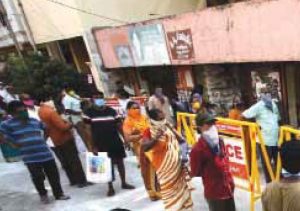 The outbreak of coronavirus has proved to be a double whammy for farmers of Indian states. The sector had suffered due to untimely rains that had flattened the wheat crop. And now the contagious disease has meant that farmers don’t get farm workers at a time when crops are ready for harvesting.
The outbreak of coronavirus has proved to be a double whammy for farmers of Indian states. The sector had suffered due to untimely rains that had flattened the wheat crop. And now the contagious disease has meant that farmers don’t get farm workers at a time when crops are ready for harvesting.
Ironically, it has happened at a time when country was expecting a bumper crop this time. Now all hopes for a record crop have been dashed and farmers are a worried lot. In addition to untimely rains, coronavirus spread, the curfews, the lock downs, the recently taken decision to narrow down application of crop insurance scheme has caused immense crisis in farm sector.
What is at stake is the food grains production, country’s buffer stock that feed a nation and livelihood of farmers at a time when the farm suicides are continuing across all states despite the hoax called farm sector waivers. As per Second Advance Estimates for 2019-20, total food grains production in the country is estimated at record 291.95 million tonnes which is higher by 6.74 million tonnes than the production of food grains of 285.21 million tonnes achieved during 2018-19.
However, the production during 2019-20 is higher by 26.20 million tonnes than the previous five years’ (2013-14 to 2017-18) average production of food grains. The 2nd Advance Estimates of production of major crops for 2019-20 have been released by the Department of Agriculture, Cooperation and Farmers Welfare today.
“The cumulative rainfall in the country during the monsoon season (June to September, 2019) has been 10 per cent higher than Long Period Average (LPA). Accordingly, the production of most of the crops for the agricultural year 2019-20 has been estimated higher than their normal product .
When farmers were buoyant, came untimely rains, hail storm and storms and then it was only on February 19, 2020 that the Union Cabinet had approved revamping of “Pradhan Mantri Fasal Bima Yojana (PMFBY)” and “Restructured Weather Based Crop Insurance Scheme (RWBCIS)” to address the existing challenges in implementation of Crop Insurance Schemes. It was proposed to modify certain parameters and provisions of ongoing schemes of PMFBY and RWBCIS. The modified scheme meant that an option shall be given to States/UTs to choose Scale of Finance or district level Value of Notional Average Yield (NAY).
Another provision was that the Central Subsidy under PMFBY/RWBCIS to be limited for premium rates upto 30 per cent for unirrigated areas/crops and 25 per cent for irrigated areas/crops. Districts having 50 per cent or more irrigated area will be considered as irrigated area/district (Both PMFBY/RWBCIS). The new scheme meant flexibility to States/UTs to implement the Scheme with option to select any or many of additional risk covers/features like prevented sowing, localised calamity, mid-season adversity, and post-harvest losses. Further, States/UT can offer specific single peril risk/insurance covers, like hailstorm etc, under PMFBY even with or without opting for base cover (both PMFBY/RWBCIS).
States not to be allowed to implement the Scheme in subsequent Seasons in case of considerable delay by States in release of requisite Premium Subsidy to concerned Insurance Companies beyond a prescribed time limit. Cut-off dates for invoking this provision for Kharif and Rabi seasons will be 31st March and 30th September of successive years respectively (Both PMFBY/RWBCIS). In case of non-provision of yield data beyond cut-off date by the States to implementing Insurance Companies, claims to be settled based on yield arrived through use of Technology solution (PMFBY alone). Enrolment under the Scheme to be made voluntary for all farmers (Both PMFBY/RWBCIS).
Little doubt that the opposition Congress said that the government is trying to shut down the Pradhan Mantri Fasal Bima Yojana in a surreptitious manner by making it completely unimplementable. The Alliance for Sustainable and Holistic Agriculture (ASHA) has written to Narendra Modi, Prime Minister of India; N S Tomar, Minister for Agriculture & Farmers’ Welfare; Nirmala Sitharaman, Finance Minister; Amit Shah, Home Minister and Dr Ramesh Chand, Member Agriculture, NITI Aayog to come to the help of suffering farmers.
ASHA is a network is a volunteer-driven large informal network of organisations and individuals. Idea is to support farmers, their livelihood as well as to ensure uninterrupted food supply chains. The note sent has urged the concerned authorities to protect farm sector with an economic support package. The note says that even as some produce itself might go wasted and most workers may not get adequate work during these extra-ordinary times.
However, for smooth food supply chains to continue, all produce should also be protected as much as possible, starting from harvesting operations having to be done on time during the lock-down period, till the retail point of purchase by consumers. The government should adopt different measures for perishables and non-perishable commodities. Some of the demands below are related to better enforcement at the ground level, of the exclusions already provided in the MHA guidelines for restrictions during the lock-down period.
No harassment of farmers
The first and foremost demand — ensure that the police deployed at the frontlines (on city/town borders, state borders and in cities etc.) do not harass and resort to violence against any farmers/primary producers who are bringing their produce (especially fruits, vegetables, milk, fish, eggs etc.) to places that they can market the same/to godowns/cold storage units etc. This then includes street vendors who will in turn sell the same by going around the urban areas, or by locating themselves in regular intervals around the urban spaces as well as truck/auto drivers who provide transportation services to these farmers.
There are many reports coming in from different parts of India about such harassment happening and mindless, over-zealous violence from police personnel. This requires the Home Ministry to send a special advisory to the police departments in all states where the frontline personnel are made to understand and appreciate that this is an essential service that is being continued for the survival and well being of all locked-down citizens. It is becoming clear that the government’s guidelines of 23rd March 2020 excluding some goods and services from the lockdown restrictions are not understood by enforcement personnel on the ground.
ID cards for farmers
The farmers, transporters, vendors etc. can be issued Special ID Cards or Passes and permissions for this period, if required. Panchayats can issue such passes to farmers, for instance. This is highly doable and should be done in a day or two. For ensuring that essential food supplies are not disrupted, it is important that mandis or regulated market yards are run, even if in a low-key fashion.
Norms can be set for separate time slots to be announced for different villages or token systems can be arranged for exact time slots to be allotted to particular farmers who are willing to sell their produce in the mandi, to ensure proper isolation. Additional protection and hygiene measures can be put in place too.
However, three weeks of the mandis closing down will mean excessive hardship for certain kinds of farmers and the same should be addressed by opening the mandis. Traders who are not keen on being exposed to the threat of the virus by being present in the market yards have the option of using e-NAM in any case. FPOs can be allowed to act as commission agents for one month as a special case, if need be.
Mobile procurement
At this time of lock-down, it is important that farmers continue to find markets, and government ensures smoothen supply chains of food. For this, village level decentralised farm gate procurement of various commodities including the regular PDS items as well as other foods, should be taken up by government agencies wherever such village level procurement does not exist now (as is happening in Telangana).
A rough calculation by Karnataka Agriculture Price Commission shows that this is in fact cheaper than the usual practice of procurement with farmers incurring some costs in the first leg of transportation/loading/unloading and the procurement agencies incurring some more costs in the second leg. This can be collapsed into one leg of operations and farmers could be willing to contribute partially to these costs. It will not be difficult to ensure fair average quality specified for each commodity with small teams going into the villages on the day of procurement. This will also prevent misuse of procurement facilities by traders, if done directly at the doorstep of actual cultivators.
Punjab model
Sub-market yard system which several states like Punjab use during procurement season can be the way forward on this. Processing mills, warehouses, Panchayat compounds etc., can be designated as sub-market yards for this purpose. PACS can be roped in for this procurement, along with women’s SHGs / federations, which could even become a long term measure for their viability and more efficient procurement.
There are reports coming from the ground that some workers (sugarcane cutters) are stranded in Gujarat and there needs to be support provided to give them safe shelter and food straightaway. It is important that all workers who are not keen on working and want to protect themselves against the threat of infection should be immediately rescued, and shelter/food provided to them.
However, there are also many instances of farmers having to harvest their produce, with adequate protection and care taken for protecting the farm workers from infection. Such work should not be brought under the lock-down, since without harvests of agricultural crops at the right time, food supply chains will be greatly disrupted in the country before and after April 15th. Where out of their own volition, farmers and agricultural labourers want to get involved in harvest work, provided they take adequate protection as overseen by the Panchayats and other line departments, the same should be allowed. In this context, Punjab government’s special orders around supporting harvesting of potato in the state can be looked at.
Free ration to farmers
 During this lockdown period, even for farmers who are into food production, there might be need for accessing other rations. The government should provide for free supply for food kits consisting of various cooking rations beyond the PDS supplies to all rural households. There is a need to follow Kerala model here, where doorstep delivery is also being taken up.
During this lockdown period, even for farmers who are into food production, there might be need for accessing other rations. The government should provide for free supply for food kits consisting of various cooking rations beyond the PDS supplies to all rural households. There is a need to follow Kerala model here, where doorstep delivery is also being taken up.
There is need to give a stimulus package to any Farmer Producer Organization (FPO) that is willing to buy from members as well as non-members, with a mandate that at least 50 per cent of the total procurement should be from small and marginal producers, and trade in the commodity later on, with very simple assessment procedures of which FPOs can be supported without waiting for elaborate business plans etc. Those FPOs which have any time in the past procured for the government can be straight away tasked with this and incentivised.
This is the only way that post-covid-19 times will have uninterrupted food supply chains without riots etc., breaking out due to shortages if some of these measures are not put into place. There should also be a specific order issued by District Collectors asking agriculture cooperative societies and state/central warehouses to be kept open with minimal staff and certain basic protection norms. Similarly, FPOs should also be allowed to operate within such norms.
Farmers of perishable produce
Farmers with perishable produce (vegetables, fruits, milk etc.) have to be prioritised in special ways to reach their produce to functional supply chains or at least to cold storage units and other storage facilities. For this APMC statutory norms would have to be relaxed for the lockdown period using other statutory provisions, with or without the legislation itself changing, where required, to waive off the fees paid in some states by buyers.
Further, even if some perishable produce goes waste, for want of prompt intervention by the government, the producers have to be supported with a fixed amount. For facilitating some of these measures, Panchayats and agriculture/horticulture/animal husbandry departments may transfer a lumpsum support to such farmers to continue with their production and supply. This can be to a tune of 10,000/- per farm household to begin with.
For vegetable supply chain, arrangements should also be made at the distribution end in the urban / semi urban areas. The bulk of the retail sales happen in govt designated vegetable mandis (or Farmers’ Markets like Rythu Bazaar or Uzhavar Santhai in a few states) and weekly haats/roadside markets that are set up in various localities across country. These mechanisms are likely to be shut down / crippled during the lockdown.
Alternative distribution mechanisms, preferably through mobile van operations should be put in place immediately so that the supply chain is not choked at distribution end, and the urban consumers’ needs are met. In existing Apni Mandis, Rythus Bazaars, Uzhavar Santhai, Kisan Bazaars etc., sales can take place with some new norms, where platforms are placed at sufficient distance from each other or even 50 per cent platforms being used for maintaining adequate distance from each other.
More warehouses, MGNREGS wages
More warehouses, godowns and storage facilities have to be notified as being accredited to the Negotiable Warehouse Receipt System so that distress sales can be prevented, even as produce is stored properly. For improving the confidence of lending agencies, a special credit guarantee fund would have to be set up by the government for expanding this system urgently.
The MGNREGS wages of 30 days should be deposited in all job card holder accounts for the next 1 month without requiring them to work in addition to immediate payments that are pending against work done earlier. Works should be stopped at NREGS worksites to protect the workers from CoVID risk. The government is also required to do this, to comply with its own directives that all government and private agencies should give paid leave to their workers and make wage/salary payments for the lockdown period including for temporary & contract workers.
The PM-KISAN is limited to only land-owning farmers at this point of time, even if they are not the actual cultivators. This is a good time to add more beneficiaries to the scheme including Panchayat-identified tenant farmers and livestock rearers, and landless agricultural workers. This can be initiated immediately and a DIT done for basic income at the time of lockdown to be passed on by the government to these citizens.
It is important that RBI instructs all banks to re-schedule loan repayments under Kisan Credit Card scheme, but with the interest rates continuing as before, and without the
non-repayment treated as default.
letters@tehelka.com












